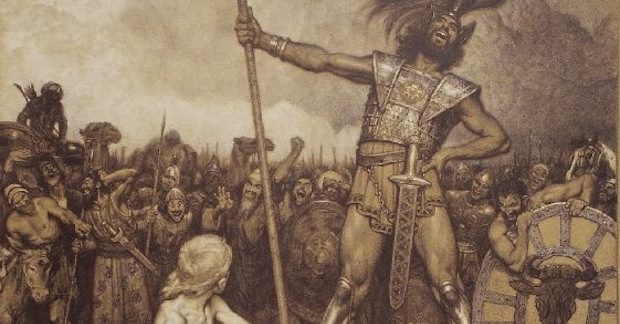Summary
Is there just one god? Tim Ritter and Nate Hanson jump into the theological deep end as they rethink the very essence of Biblical monotheism. Buckle up as they start to uncover surprising ideas behind the story of the Bible.
Transcription
Tim: Here we are. Almost Heretical, episode 2.
Nate: Episode 2!
Tim: So a big part of what we wanted to do with this podcast is try to back up a bit from some of these twitter debates and heated conversations that we seem to always be having and go back to sort of the beginning of the road with some of our ideas, especially as it pertains to Christian theology and what the Bible means and what we’re supposed to do with it, and reexamine some of our foundations. Some of where we’re going to start over the next few episodes is going back to the beginning of the story, of the Bible, back to Genesis, and essentially trying to follow some breadcrumbs, and pay attention to some clues that will reveal that we’ve missed a lot here. There is such a massive chasm between our worldview today and the worldview of the biblical authors and the audience that they were writing to and how they thought about life and thought about how the cosmos was organized and what it meant to be human and what it meant to know God, all of that stuff. We’re coming from such a different angle that there are things that we simply read and interpret in a way that would be totally foreign to the original authors, and there are things that we totally miss because we just don’t have the paradigm for them. So, what we’re going to do is kind of—it’ll probably end up being one of our deepest dives into some biblical theology, going back to the beginning and trying to pick up some of those missing pieces, fill in some of the gaps in our information, and what I think we’re going to discover is some mind-blowing twists and turns along the way and some stuff that we just never realized was there.
Nate: Yeah, and I think the reason we want to go back to the beginning is because, if you get the beginning wrong, and maybe there’s other stuff there that we’re not seeing or other stories they had in their head that we don’t have in our head, then you have kind of the whole problem wrong, the problem that we’re trying to solve. And if you have the problem wrong, then the problem with that is you kind of make up solutions or there’s kind of half solutions that you run with and they never quite answer all the problem and they never quite feel right. So the goal here is to back to the beginning, to reexamine the fall. We’re going to start there and see if there’s something bigger going on (hint: there is) that we can then use to bring to the practical conversations that we’re having with our friends and our family and our neighbors. So yeah, that’s what we’re trying to do.
Tim: Yeah, so if you’re like us, you kind of grew up where you have a paradigm that you filter the whole world of theology through, it’s this Creation – Fall – Redemption three part paradigm. And we can get into whether or not that’s valid later as a paradigm, but essentially what’s peculiar is the way we frame it makes it sound like those are almost one third equally weighted. But the reality is that you get into both the creation and the origin story, the origin mythology that the biblical authors had in mind, and you get into a much more complex view of the Fall than most of us have been taught to consider, and you even get into, essentially, at least a beginning statement of what redemption will mean and entail literally all within the first twelve chapters of the book of Genesis—less than 1% of the entire Bible. So everything from that point on is based on having a really sufficient, thorough grasp of what the problem is that the rest of the story is working to resolve. So we’re going to spend an inordinate amount of time in these early chapters because logically it’s just demanded to get a basic framework for theology. It’s kind of like the analogy where, if you read a book or watch a movie, say you’re reading Harry Potter, and you decide to just skip the first book in the series of Harry Potter. You can read books 2-7 and still find some pretty interesting, insightful, exciting stories. But the reality is you’re going to be missing a whole boatload of points. And even worse, you won’t just be confused and kind of ignorant as you go; there will be multiple occasions where you think you know precisely what’s happening, but because you’re missing the whole reference point, because you didn’t read book 1, you’ll be thinking you get it when you absolutely don’t. And that’s one of the most toxic forms of confusion in terms of ideas, especially when it comes to religious theology, is the confidence that we’re getting something right. That confidence causes us to not even check for blind spots or to reexamine our thinking, and when it’s based on holes or missing pieces of information, what it can become is basically this sense of false security that what we believe is the way that everybody is supposed to believe. And part of what Nate and I have experienced is what this creates is just dead ends. A lot of the conversation, a lot of the debates, a lot of the massive division in the culture and the church is just two groups or parties on different sides of an aisle that feel like their way of seeing things is absolutely the only one, and there’s just no budging. And so, a big part of our heart is to say, actually if we do decent biblical theology, if we just start to read a little better and a little more carefully and listen more attentively, there’s a whole world of additional information, a whole world of new perspective that we could take and then apply to some of the most important issues of our day.
Nate: I think it’s important to also say, right around now: part of the reason we call the show Almost Heretical is because we know that some of the stuff that we’re going to hear, or even going back and looking at some of these verses again and saying, “Hey, maybe there’s something else going here?” To a lot of people, they’re going to say that’s heresy to do that. And I think that’s part of the problem. It’s too easy in our day and age, for these two groups that Tim talked about, it’s too easy in our day and age and this time in the church right now—or maybe it’s been happening for hundreds of years—to look at a group of people or a person that loves the Bible and is maybe reexamining some things and wanting to have integrity in how they’re doing that and is being careful in that way, to look at them and to say, “Okay, they’re now outside this circle that I’m drawing. We’ll pray for them, they’re on the outside, whatever, but it’s a slippery slope to basically not being a Christian anymore.” And the problem with that is that it keeps people from exploring their questions, and it forces them to be certain about what they believe and “certain” about things that they might not even believe just to stay inside the circle.
Tim: I think a lot of people have been told and come to feel that if you get to a place where you’re questioning your church or your pastor’s positions or the interpretation of your tradition, or you get to a place where you’re questioning the validity of some of these coalitions that have positioned themselves as The Religious Authority, you’re made to feel almost as if it’s you versus the Bible. So part of the reason we named this Almost Heretical is kind of to poke at that and say, “Hey, there are whole lot of ways to look at this thing, a whole lot of ways of making sense of Jesus and the Bible.” And some of the groups that are the most adamant, that they have The Authority to say what is good and true and orthodox are some of the groups that are most missing it, some of the groups that are most lacking some of the big picture. So we’re in no way claiming that we have the true interpretation or the one great denominational approach to end them all, but this is our attempt to get out of that for a little bit and say, “Hey, let’s just actually explore and ask some honest questions and be honest with what we’re wrestling with.” And the reality is, I think what we’re going to find is awesome. As Nate mentioned before, it can be painful to go through a season of deconstruction where it feels like old ideas have to die, and therefore old identities based on those ideas or even the tribal affiliations of the church communities that we were attached to, those might have to die as well. But the reality is, there’s a whole other world to be born into. So here’s our attempt at kind of diving in.
Nate: Okay, so we’re going to go back to the beginning of the Bible, and we’re going to reread the story and see if we’ve missed anything. And I want to be clear, some of the stuff we’re going to get into, some of the stuff is weird, and it’s the verses that we just kind of skip over and get onto the stuff that we do understand, and we’re not going to do that. We’re going to sit in those verses and we’re going to see if there’s a connection between some of this stuff. But I want to be clear this whole podcast isn’t going to be just about finding the weird verses in the Bible. Our goal is to look at these verses, see if there’s some things that connect them, and see if there’s some bigger story going on that maybe we haven’t really paid attention to. And then we’re going to use that framework to go back and talk about the issues that are so important in our day: Christianity in Trump’s America, and race and gender equality, and power and control, and we’re going to see if this new framework helps us have these conversations in a better, more helpful way without banging our head against the walls and continuing to run against the same roadblocks.
Tim: And as Nate said, some of this stuff’s going to be weird and that actually shouldn’t be surprising. Some of the reason it’s new to us, or some of the reason we’ve skipped over some of these passages and ideas in the biblical texts, is because it feels weird. It feels uncomfortable. We’ll look at some verses that, essentially I think most of us have just all quietly agreed to not really talk about and pretend aren’t there. And the reality is that I think we all hoped that the effect of that choice would be pretty minimal. But the case we’ve made is it’s not. These are some of the foundational passages of the text that everything else is built on. And so what happens is that by the time you get to the end of the story, by the time you get two thousand years later, with all sorts of developments in our thinking, those holes, those missing pieces have steered us off course so far that some of the things that are to us core ideas to our theology are drastically skewed because of some of the stuff we missed on these beginning pages of the text. So get ready, it’s going to be weird, it’s going to be uncomfortable, and that’s the point.
Nate: Alright, Tim. I think we’ve prepared them. They’re ready for you to unleash the dragon, so let’s go. Let’s do this. What’ve you got?
Tim: So, I’m still looking for a term to label this box that I’m saying is kind of Pandora’s box that we’re about to unleash unwittingly upon you poor souls. We just keep calling it, “The weird stuff,” or I’ve used this metaphor of backfilling missing information, but I think really what we’re going to be searching for is trying to get closer to the worldview, the framework, and especially the cosmological worldview in terms of how this cosmos, this universe, this world is arranged and who’s here, and what are our roles and that sort of thing, sort of the origin stories, to get closer to what the biblical authors and the original biblical audiences had in their heads. We’ll use some examples and get into some particular cases, but what we’ll see is that there are some place where the Bible’s just clearly saying things that we really haven’t listened to, and we’ll focus on some of those, but there’s also a lot that the Bible doesn’t—there aren’t passage of the Bible that sit down in which the author says, “Okay, I’m going to explain this idea to the listener.” And because there aren’t passages of just a clear explanation of an idea, now, thousands of years later, when we read it, we don’t get those ideas. And yet there are ideas that the authors simply assume that their audience was familiar with, and the reason they don’t sit down and explain it is because they feel so confident that they can assume everybody’s familiar with those ideas. So it’s actually some of the most foundational, worldview ideas that oftentimes are left out of the text that we have and are left out because they could be so easily assumed to be understood by everybody around.
And what we’re going to do is almost look for breadcrumbs or clues where the author may be talking about something else, but in his wording, in the metaphors he chooses to use, in the metaphors he chooses not to use, there are little clues that show up that there is some idea or story or mythological concept that both he and his readers have in their heads. And some of them end up being absolutely huge and central and paradigmatic for the entire biblical story. So what we’re going to do is kind of like some detective work. I’ve done a lot of that work ahead of time, mostly following some other really great scholars, but collected some of the major pieces, and so what we’re going to do is jump in there and look at it. We’ll never perfectly arrive at the worldview of the biblical authors, but once we’ve made some major strides—and I’ll contest that there are a few particular pieces that we are glaringly missing and that were totally central to the whole world of ancient Israel—that once we get those pieces, then we can go and reexamine some of the texts that some of us have been reading our entire lives and either had no idea what to do with or thought we knew what to do with, and see, oh actually sometimes those are about something entirely other than what we thought they were about. So we’re going to be searching for a worldview, and the reason Nate and I call this, “The Weird Stuff,” is that some of the pieces that are the most absent from our modern western, secularized worldview now, when we go find them, they feel really strange and uncomfortable to us. And a lot of it, we’ll see, has to do with a conception of a supernatural heavenly realm, and a whole organization of beings that live in that realm, and relationships between that realm and the realm that we live in here on earth. A lot of it is stuff we simply don’t talk about in church and certainly don’t talk about with our friends at work. It feels weird, it feels strange, it feels like why are we talking about this stuff, what does it have to do with Jesus at times? But we’ll make the case that it has everything to do with Jesus and the whole rest of the story of the Bible. Essentially we’re going to stop protecting ourselves and you all from the discomfort of some of these passages and just try to get into for a little bit and try to come out the other side.
Nate: Cool. Let’s do it.
Tim: So the first piece of weirdness that we’re going to jump into. I think everybody’s familiar with the idea that Christianity and Judaism are monotheistic, and I’m not going to argue that they aren’t monotheistic, but I’m going to try to make the case that monotheism—at least Jewish monotheism, and therefore Christian monotheism—does not mean what most all of us have thought that it means. Specifically, it doesn’t mean that God is the only divine, spiritual being that exists. And we’ll have to do some definitions and get into some words here, but let’s just look at a few passages and kind of take a second be like, “Huh, there’s something interesting there!” So I’ll read through a few passages and then we’ll get into some more detail later. So, first one we’ll look at is Psalm 82:
1 God has taken his place in the divine council
In the midst of the gods he holds judgment:
Tim: Skip down a little bit to verse 6, this is Yahweh speaking:
6 I said you are gods, children of the Most High, all of you;
nevertheless, like men you shall die, and fall like any prince.
Tim: Okay, that’s interesting. It appears that in the psalm, God is talking to some other beings called gods, okay? Let’s look at the very beginning of the Bible and go to Genesis 1. You have this very first chapter, the creation account. You have God creating the earth, the land, the seas, and the animals, and then in verse 26, God says:
26 Let us make man in our image, after our likeness
Tim: Stop. First of all, if—I guess, first question is: who is God talking to that he’s willing to say something out loud to another person at all? And if he’s using the plural language of, “Let us make mankind in our (plural) image, in our (plural) likeness,” what the heck is going here? And I think a lot of us, since it’s Genesis 1, we’ve all at least gotten this far in our Bible reading plans once, we’ve encountered this verse before, but it just kind of seems so ambiguous, so mysterious, so subtle, even, that we’re just like, “Well, don’t really know what to do there, so we’ll just kind of forget about it.” But you literally only have to go three chapters forward to Genesis 3. So now you’ve had the creation story, and then you have the fall of Adam and Eve, which we’re going to get to quite a bit, but for now just look at verse 22
22 Then the LORD God said, “Behold, the man has become like one of us in knowing good and evil.”
Tim: So once again you have God speaking in a reference to some sort of community, some sort of group that he is a part of that apparently existed before the creation of Adam and Eve. And I’ll just say here, if we think that in the first three chapters of the Bible that these writers weren’t careful enough to figure out whether they wanted to use singular verbs or plural verbs, we’re joking ourselves. There’s something very intentional, careful, purposeful and actually theologically loaded that’s happening here. And secondary piece: the fact that the Jewish community didn’t struggle with this kind of language for hundreds and hundreds of years indicates that there was something in their mind that allowed them to make sense of this kind of language that isn’t in our mind. And so where we get confused—and this’ll be kind of a hermeneutical approach for us—if we get confused or caught up or stuck in an argument that the majority of the Jewish community or the church community never got caught up in at that point, then we probably have backed ourselves into some sort of dead end and made a mistake at some point, and it’s probably worth backing up to see if we can figure out where we’ve gone wrong.
One more. This one we’ll spend a lot of time in, and I think it’s probably, in terms of weird Bible passages, it’s probably the pinnacle. Genesis 6. This is one I laugh at. There legitimately is just an unspoken consensus in the church, at least in the world I come from, that we’re just not going to talk about this, and when we all do our Bible reading plans, we’re going to read through the creation story, we’re going to talk about adam and eve, we’re going to talk about the serpent, we’re going to read Genesis 6:1-4, we’re going to go, “Huh!” And then we’ll just go back to Noah and the flood story and talk about that a little bit more. I’ll read it here so we can take it in for a second.
When man began to multiply on the face of the land, and daughters were born to them, the sons of god saw that the daughters of man were attractive, and they took as their wives any they chose. Then the LORD said, my spirit shall not abide in man forever, for he is flesh. His days shall be 120 years. The Nephilim, or giants, were on the earth in those days and also afterward, when the sons of god came into the daughters of man, and they bore children to them. These were the mighty men of old, the men of renown.
Nate: Oookay! Yeah.
Tim: So what we’ll spend a few episodes doing is actually showing that while right now, for most of us, we read that, throw up our hands, and go, “This makes no sense whatsoever,” not only is there a way to make sense of this—there’s a way to make pretty clear sense of this—there’s actually a way to gather a lot of meaning from this passage. And we’ll start to see that (we shouldn’t be surprised, this is some of the earliest stuff written in the entire biblical story) it ends up being actually completely central and referenced later on throughout the scriptures. It is essentially referencing an idea or a story, a kind of framework of the beginnings of creation that every biblical writer and pretty much every Bible-studying Jew had a clear conception of in their mind. And in our western protestant world we have no idea what this is even referencing, and this is evidence of one of the biggest gaps that we have in our information, in our worldview, and this gap just ends up widening and widening and widening as you get further and further in the story, to the point where you get to the end of the scriptures. And the things that the book of Revelation, for instance, is saying that are assuming you know this and you’ve known how the rest of the texts have interacted with a text like this—if you miss that bus all the way back here in Genesis 6, then we end up so far from what a lot of the later texts are saying. We simply don’t know what they’re about. So I used the metaphor of watching a movie or reading a book. Pretty much every decent story centers around some sort of problem that needs to be resolved, and in the collective story that the library of scripture tells, the problem is presented very early, you see it in Genesis 3. So for us we’re actually going to spend some of the first few episodes talking about the Fall, or to back up from that loaded language, talking about the problem in this story that the Bible is telling, so that when we move forward, we have a better picture of what the Bible is trying to resolve and how it’s going about trying to resolve that. And we’ll see that this passage here, Genesis 6:1-4, is actually a part and an important layer of that problem. And just to highlight another one, go to the end. Go to the New Testament in Revelation. We’ll see lines like this, and it’s throughout the scriptures, but just to use one example, in one of the letters to the churches in Revelation 2—and this kind of language actually shows up in all of the seven letters about the reward coming to those who persevere—but look at Revelation 2:25-26
Hold onto what you have until I come. To the one who conquers [or perseveres] and who continues in my deeds until the end, I will give him authority over the nations. He will rule them with an iron rod, and like clay jars he will break them to pieces.
Tim: Now, what do we do with a text like that when we sit around a group of people and talk about, “What does it mean to be a Christian in our time and place?” And we’ll see that there’s a whole world of paradigms, of frameworks, of ideas, that this line and lines like it are making a reference to. If we’re missing that framework, either we look at this and go, “I have no idea what it means for Jesus to give me authority over the nations so I’ll rule them,” or worse, we make up what we think that means. And Nate and I’ll probably share all sorts of our thoughts on the religious right in America and people like Franklin Graham and all that sort of thing, but safe to say, it is not only—you don’t only miss things if you’re missing some of this framework, it actually poses a danger to getting to the place where we’re making up for ourselves what to do with these texts. So one of the petitions we’ll make here is that what Jewish monotheism means, when we think about texts like Psalm 82 and God talking seemingly to other beings in the creation account—we’ll get into some of the details later on—what Jewish monotheism means is not that God is the only divine spirit being in the cosmos, but that God is the one, true, ultimate creator who is King over every other being, who created all other life. And what we are called to, what is Israel is called to, what the church is called to is to worship that one God, Yahweh, as supreme over those others, as incomparable and unique among the other beings. To look at this real quick, one of the immediate pushbacks is the Shema, and as most of us are familiar with, the Shema is what we call one of the most central verses in all of Judaism. It’s kind of the flagship passage of sorts that is a summary of what it means for Jews to be loyal to Yahweh. It’s in Deuteronomy 6:4. It’s called the Shema because the first word, which we translate as, “Hear,” or, “Listen,” is shema in Hebrew.
Hear, O Israel: The LORD our God, the LORD is one.
And then it goes on to say:
Love the LORD your God with all your heart, with all your soul, and with all your strength.
Now, we can get into the weeds of this later, but if any of you guys have a study Bible or you open up a Bible on the internet or something like that, you’ll see that the word one, where we say the LORD is one, is the Hebrew word echad, and that word can mean one, but can also mean unique or essentially incomparable.
Nate: I see on my note when I click on it, the LORD our God, the LORD alone.
Tim: Yeah, so if you pull up, for instance, the NRSV is one translation that’ll say
Hear, O Israel: the LORD is our God, the LORD alone
Tim: So the idea here is, you can keep the word one in the translation, you just have to know, this isn’t about counting gods. This isn’t a numerical formula for knowing God. If that were the case, that doesn’t carry much meaning, if the idea simply here is that there is one god, this verse would be kind of an aside in Jewish theology, it wouldn’t be the central text. The point is instead that Israel is only supposed to worship their true God, Yahweh, who chose them to be his people, and to worship other gods, called idolatry is an act of tragic disloyalty to Yahweh. So this is a commission here, it’s a challenge. It’s essentially their ethical standard, that what it means to be Israel, what it means to be Jewish—and for us too, as Christians—is to worship God alone, or Yahweh, as unique in the cosmos. What that changes for us is it opens a door for us to say, are there other divine beings? In Psalm 82, when the text says that God is talking to gods and some other places we see the sons of god, what are these beings, what does it mean for us if we grant the possibility that there are other real gods out there? And what we’ll start to see is that, not only is that idea attested to throughout the entire scriptures, but there are other ideas contingent on that way of seeing the world, that cosmological worldview, that are some of the central ideas underlying the entire biblical story.
Nate: Okay, okay, Tim, so this is really good stuff. It’s a lot. It changes a lot of stuff, I think, and I think what would be helpful is to know, where is this going? What do you see—once we understand this, and we’re going to get into the fall in the next few episodes, once we understand this stuff, what is the end game? What can this potentially change in our theology that we use on a day-to-day basis, the way we view the world, the way we view Jesus—what can this actually change for us?
Tim: Yeah, that’s a great question, and I think one of the most important questions we can ask. Partly because the answer is, pretty much everything. Again, the metaphor is that this is the beginning of a book. If we miss the beginning, or we don’t understand the beginning, or we think the beginning means something that it doesn’t mean, we end up getting so far off track that the paradigms we’re using are simply not the same paradigms. So that’s where terms like worldview are so helpful nowadays. What we’re trying to do is piece together the breadcrumbs to get closer to the worldview, closer to the whole collection of thoughts and ideas and myths and paradigms and mental frameworks that were in the heads of these people who were part of this literature. And the closer we can get to doing that, the closer we get to understanding what they meant, what they were doing, what they were saying. And I think we’ve just been sort of stuck in a hole in the western wing of the church because we’re so conditioned to want to boil everything down into bullet point teachings, bullet point explanations. It’s the world of systematic theology, where we want to put everything into nice, clean, organized boxes, parse it all out. But the Bible doesn’t do that. The Bible tells stories, the Bible is literature for the most part. It’s based on literary ideas; it’s based on mythological motifs; it’s based on symbols and cosmic ideas. And so there isn’t a place where we can just go read The Top 10 Teachings in the Bible on the Cosmos. It’s not that easy. We essentially have to back up and piece together this big, complicated puzzle, to re-piece together the worldview of the authors. And as we said, some of the most important pieces for us to see are specifically the pieces that no one sits down to articulate explicitly. It’s because they assume that everybody has these ideas in their head already, but we don’t. And so it’s hard to know—the first part of the answer to your question, Nate—it’s hard to know where and when the ramifications are going to play out. So for now, I guess, take my word for it, but what I’ve started to see is conversations around atonement and what the cross meant, what Jesus’ mission was, why he came and what he was trying to do, we’ll get into the role of exorcisms and why you see demons everywhere in the gospels. And we’ll start to connect between some of the geography and place names and even the genealogies that we’ve all just sort of brushed past because they seem like sort of nebulous lists that don’t mean much. We’ll realize, “Man, these things are loaded with significance, theological significance.” When we talk about issues of , we’ll get in here soon to looking at the conquest of Canaan and thinking about how to make sense of what appears like gross on God’s behalf in the Old Testament. How do you reconcile that with the Jesus of the New Testament? We’ll get into power and the role of the church. I mean, this is one the areas that I’m most frustrated with and rubs me the wrong way is, when you get into the book of Revelation or some of the apocalyptic literature in the New Testament, and then you start trying to make a case for a Jesus that proved ultimately nonviolent in his life on earth, then we start trying to build a case for how violent Jesus is going to be when he comes back because we don’t know what to do with texts like the book of Revelation, we don’t know what they’re talking about. And none of the references to all of the crazy figures and animals and beasts and all that in books like Revelation—we don’t have any of that stuff in our heads, we’re missing the references, but we think that we can make it work without it, and some of where we end up is just horrible, and it’s antithetical to the way of Jesus. Eschatology, what we’re waiting for, heaven and hell and all of that stuff, will slowly but surely end up getting flipped on its head, and we’ll have whole new paradigms to approach this stuff. So I know it sounds weird, right now we’re talking about, “Wait, there are other gods? Who are they? Why are we even talking about this stuff?” This sounds like weird content relegated for the deep, dark holes of YouTube. I get it. Bear with us. From here we’re going to get into the Fall for a few episodes, and that’ll be essentially the center point to say, based on this worldview, what the biblical authors are saying is wrong with the world, and therefore what God is trying do to set this world right is categorically different when you approach it from the biblical authors’ worldview as to when you approach it from our modern worldview. And that will play out in a hundred different ways, and it will play out in areas of our lives that have been some of the most painful, frustrating, disorienting experiences of Christianity where the theology that we’ve been told we have to hold just doesn’t line up with life. And I’ve experienced, through walking through some of this weirder theology, through getting into the uncomfortable stuff and waiting and being patient until I find enough information to make sense of it, that there are whole new ways that are liberating and life-giving and good.
Nate: I’m so excited to start getting into all this stuff. We’re going to do a few episodes on the Fall, including some question and response episodes coming up here, and then we’re going to start jumping into using this new worldview to look at some of the controversial issues of the day and the things we’re talking about with our neighbors and friends and family and everything. Feel free to reach out to us at almostheretical.com. Feel free to subscribe to the show so that you’ll get notified of all new episodes. And finally, if you wouldn’t mind, we’d love it if you could go onto iTunes and leave a review for this podcast. And the reason for that is because the reviews on iTunes help more people find the show. So that’d be super great if you could do that, and we’ll see you at the next episode.
For Nate and Tim, this is Almost Heretical.
Tim: Peace.









